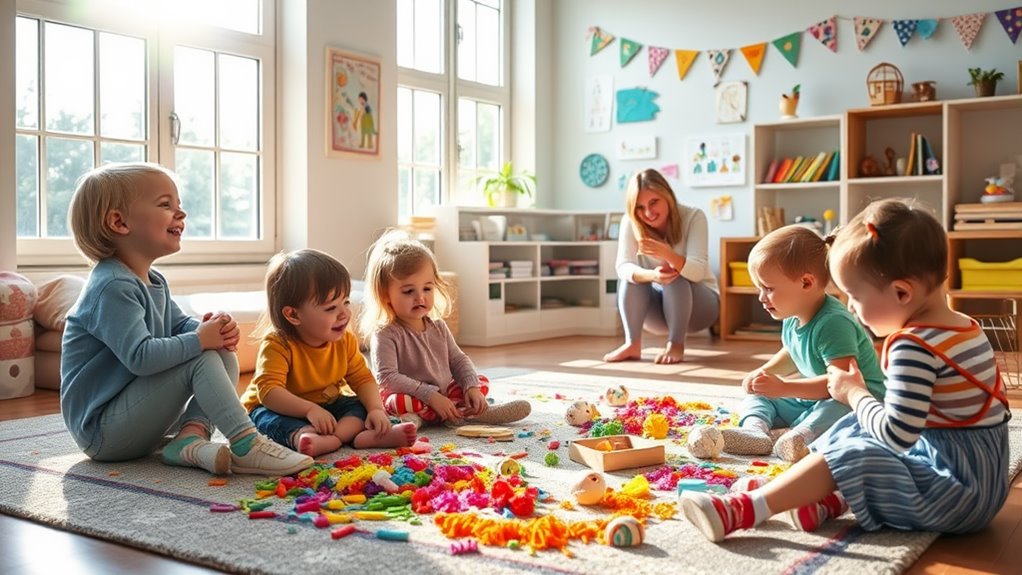The Hidden Secrets of Early Childhood Education You’ve Never Heard Of!
You might be surprised to discover the hidden gems in early childhood education that go beyond typical classroom techniques. Play-based learning ignites creativity and social skills, while storytelling weaves narratives that encourage empathy and critical thinking. Incorporating mindfulness practices can boost emotional resilience, making kids more aware and focused. Nature immersion adds another layer, promoting cognitive development and well-being through outdoor exploration. Lastly, embracing collaborative projects helps children thrive in teamwork and communication. These methods create a nurturing environment that inspires a love for learning. Stick around to uncover even more insights that can enrich your child’s educational journey!
Key Takeaways
- Imaginative play not only sparks creativity but also enhances critical thinking skills essential for problem-solving in early childhood education.
- Engaging storytelling fosters empathy and comprehension, making it a powerful tool for connecting children with diverse perspectives.
- Mindfulness practices, like gratitude journaling, cultivate emotional resilience and improve focus, setting a strong foundation for lifelong well-being.
- Nature immersion promotes cognitive development and resilience, allowing children to learn through exploration and navigate challenges in a safe setting.
- Collaborative learning approaches empower children to develop teamwork and communication skills while deepening their understanding through peer interactions.
Play-Based Learning Techniques
When it comes to early childhood education, play-based learning techniques are undeniably effective in fostering a child’s development. By engaging in imaginative play, children explore their creativity while developing critical thinking skills. You’ll notice that when kids pretend to be different characters or create elaborate scenarios, they’re not just having fun; they’re also honing their social skills and emotional intelligence.
Sensory exploration complements this by allowing children to engage with their environment through touch, taste, sight, sound, and smell. When you provide opportunities for sensory activities—like playing with sand, water, or even edible materials—you’re sparking curiosity and encouraging exploration. This hands-on approach deepens their understanding of the world around them.
Encouraging imaginative play and sensory exploration in a structured environment offers children the freedom to learn naturally. You can support this by creating diverse play areas that stimulate their senses and imagination. Remember, the more engaged they are, the more they learn. By incorporating these play-based techniques into your educational approach, you’re not only nurturing their intellectual growth but also fostering a lifelong love of learning.
The Power of Storytelling
Storytelling holds remarkable power in early childhood education, serving as a bridge to imagination and understanding. When you harness effective storytelling techniques, you create a vibrant landscape where children can explore ideas, emotions, and cultures. Engaging narratives captivate young minds, fostering a love for learning that lasts a lifetime.
Incorporating elements like character development, conflict, and resolution not only enriches narrative development but also helps children relate to and interpret their own experiences. As you weave stories, encourage children to participate by asking questions or predicting outcomes. This involvement boosts their critical thinking skills and reinforces comprehension.
Moreover, storytelling cultivates empathy. As children step into the shoes of different characters, they learn to understand diverse perspectives, nurturing emotional intelligence. The rhythm and patterns of storytelling also enhance language skills, expanding vocabulary and enhancing fluency.
Mindfulness Practices for Kids
Mindfulness practices for kids create a powerful foundation for emotional and mental well-being. By introducing these techniques early on, you’re equipping children with essential tools to navigate their feelings and reactions. One effective practice is mindful breathing. Encourage kids to take a few moments each day to focus on their breath. This simple exercise helps them cultivate awareness, manage stress, and develop a sense of calm amidst chaos.
Another impactful technique is gratitude journaling. Encourage your child to write down or draw three things they’re thankful for each day. This practice fosters a positive mindset, helping them appreciate the small joys in life. It’s a beautiful way for them to reflect on their experiences, promoting resilience and emotional intelligence.
Incorporating these mindfulness practices into daily routines not only enhances children’s focus and self-regulation but also strengthens their social skills. As they learn to be present and grateful, they’re more likely to develop empathy and compassion. By guiding them through these practices, you’re nurturing their ability to thrive in an ever-changing world, setting the stage for a lifetime of emotional resilience and well-being.
Nature Immersion Benefits
Integrating mindfulness into daily life can lead you to another enriching experience: nature immersion. Embracing the great outdoors not only nurtures your children but also fosters a profound nature connection that sparks curiosity and wonder. When you encourage outdoor exploration, you unlock a world of benefits, including:
- Improved emotional well-being and reduced stress
- Enhanced cognitive development and creativity
- Strengthened physical health through active play
By immersing your children in nature, you create opportunities for them to engage with their surroundings meaningfully. They’ll learn to observe, question, and appreciate the intricate details of life. This active engagement promotes critical thinking and problem-solving skills, essential for mastering their environment.
Moreover, nature immersion allows kids to develop resilience as they encounter challenges during outdoor adventures. From climbing trees to exploring streams, they learn to navigate risks in a safe, supportive setting.
Incorporating nature immersion into your daily routine not only enriches your child’s learning experience but also reinforces the importance of the natural world. Ultimately, the more time they spend in nature, the deeper their connection will grow, fostering a lifetime of appreciation and stewardship for the environment.
Collaborative Learning Approaches
Embracing collaborative learning approaches can transform your child’s educational journey into a vibrant, interactive experience. When kids engage in group projects, they’re not just learning content; they’re developing critical social skills and emotional intelligence. This environment fosters teamwork, encouraging them to share ideas and perspectives.
Peer teaching is another cornerstone of collaborative learning. When children explain concepts to one another, they deepen their understanding and reinforce their knowledge. This method builds confidence, as they take ownership of their learning while supporting their peers. You’ll notice that your child becomes more communicative and willing to ask questions, which is vital for lifelong learning.
Moreover, collaborative learning nurtures creativity. When kids work together, they combine their unique talents and viewpoints, leading to innovative solutions and richer outcomes. You’ll see your child actively participating, brainstorming, and experimenting, which enhances their ability to think critically.
Frequently Asked Questions
How Can Parents Support Play-Based Learning at Home?
You can support play-based learning at home by incorporating creative play into your family routines. Set aside time for imaginative activities, encourage exploration, and foster an environment where curiosity and creativity can thrive together.
What Age Is Best to Start Mindfulness Practices?
Starting mindfulness practices around age three can be beneficial. At this age, kids grasp mindfulness techniques easily, enhancing focus and emotional regulation. You’ll see significant preschool benefits as they develop resilience and a calm mindset.
Are There Specific Stories That Enhance Emotional Intelligence?
As the saying goes, “A picture’s worth a thousand words.” Empathy building stories and narrative-driven activities immerse you in characters’ emotions, fostering understanding and emotional intelligence. Choose tales that resonate, and watch connections flourish.
How Can Nature Immersion Impact Social Skills?
Nature immersion boosts social skills by encouraging nature exploration. As you engage with peers outdoors, you foster teamwork, communication, and empathy, essential for social development. Embrace the outdoors to nurture connections and strengthen relationships with others.
What Are the Long-Term Benefits of Collaborative Learning?
Imagine a well-oiled machine; that’s what collaborative learning creates. By honing your collaborative skills, you’ll reap teamwork benefits like improved problem-solving and communication, leading to lasting relationships and success in various life areas.




